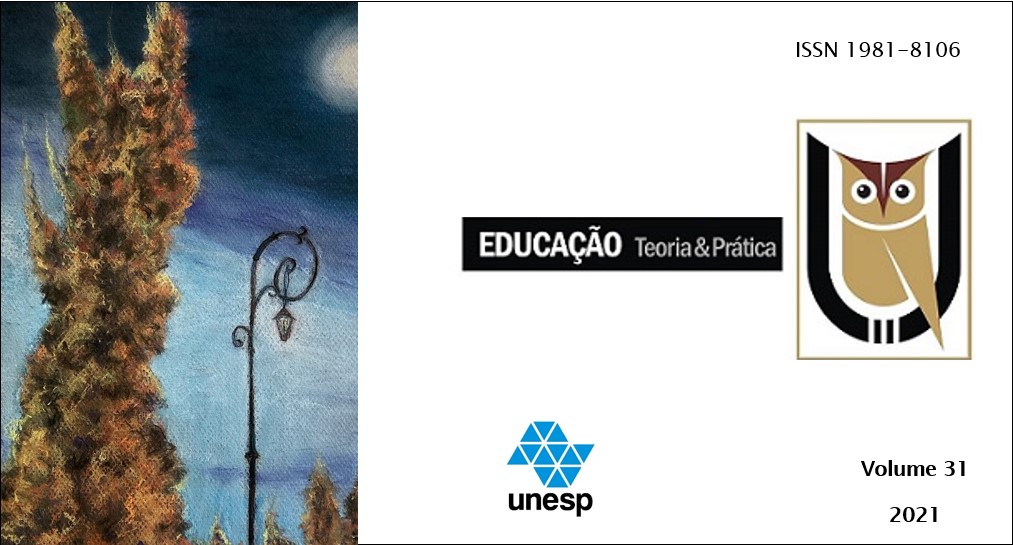Gestão democrática: micropolíticas em uma escola municipal do Rio de Janeiro
DOI:
https://doi.org/10.18675/1981-8106.v31.n.64.s13760Palavras-chave:
Gestão democrática. Micropolíticas. Contexto da prática.Resumo
O presente artigo propõe abordar algumas reflexões e tensões sobre a relação entre gestão democrática escolar e a produção de micropolíticas. Para isso relata aspectos observados em uma escola pública da rede municipal do Rio de Janeiro e traça alguns deslocamentos sobre o “conceito de gestão democrática”, baseando-se no ciclo de políticas de Ball e Bowe (1992). O intuito é ecoar como os arranjos políticos e o funcionamento das micropolíticas fazem emergir arenas de disputas internas e até mesmo a ambivalência da noção de gestão democrática. Trazer a escola para este texto ajuda-nos a pensar sobre diferentes aspectos da micropolítica no contexto da prática: o funcionamento das disputas políticas que constituem o processo de gestão na unidade escolar, dos quais emergem negociações e conflitos, evidenciando não só as relações de poder em que se dão.
Referências
ARELARO, L. R. G.; JACOMINI, M. A.; CARNEIRO, S. R. G. Limitações da participação e gestão democrática a rede estadual paulista. Educação e Sociedade, Campinas, v. 37, n. 137, out./dez. 2016.
BALL, S. J.; BOWE, R. Subject departments and the “implementation” of National Curriculum policy: an overview of the issues. Journal of Curriculum Studies, London, v. 24, n. 2, p. 97-115, 1992.
BALL, S. J.; MAGUIRE, M.; BRAUN, A. Como as escolas fazem as políticas: atuação em escolas secundárias. Tradução Janete Bridon. Ponta Grossa: UEPG, 2016.
BHABHA, H. O local da cultura. Tradução de Myriam Ávila, Eliana Lourenço de Lima Reis, Gláucia Renata Gonçalves. 2. ed. Belo Horizonte: Editora UFMG, 2013.
BOWE, R.; BALL, S.; GOLD, A. Reforming education & changing schools: case studies in policy sociology. London: Routledge, 1992.
BRASIL. Lei nº 9.394 de 20 de dezembro de 1996. Lei de Diretrizes e Bases da Educação Nacional. Disponível em: http://www.planalto.gov.br/ccivil_03/Leis/l9394.htm. Acesso em: 7 jun. 2018.
BUTLER, J. Fundamentos Contingentes. Cadernos Pagu. Campinas: SP, n. 11, p.11-42, 1998.
FERNANDEZ, S. Projeto Político Pedagógico e cotidiano escolar: retrospectivas, deslocamentos e possibilidades. In: AMARAL, D. P. do. Gestão Escolar pública: desafios contemporâneos. Rio de Janeiro: Fundação Vale, UNESCO, 2015.
FERREIRA, V. da R. S.; MEDEIROS, J. J. Fatores que moldam o comportamento dos burocratas de nível de rua no processo de implementação de políticas públicas. Cad. EBAPE.BR, v. 14, n. 3, Artigo 1, Rio de Janeiro, jul./set. 2017.
HALL, S. Quando foi o pós-colonial? Pensando no limite. In: HALL, S. Da diáspora: identidades e mediações culturais. Belo Horizonte: Editora da UFMG, 2003, p. 116-123.
MAINARDES, J. Abordagem do ciclo de políticas: uma contribuição para a análise de políticas educacionais. Educ. Soc., Campinas: SP, v. 27, n. 94, p. 47-69, jan./abr. 2006.
MAINARDES, J. Reflexões sobre o objeto de estudo da política educacional. Laplage em Revista. Sorocaba: SP, v. 4, n. 1, p. 186-201, jan./abr. 2018.
OLIVEIRA, A. C. P. de; WALDHELM, A. P. S. Liderança do diretor, clima escolar e desempenho dos alunos: qual a relação? Ensaio: aval. pol. públ. Educ., Rio de Janeiro, v. 24, n. 93, p. 824-844, out./dez. 2016.
PARO, V. Diretor Escolar? Educador ou gerente? São Paulo: Cortez, 2015.
SILVA, J. M. A. de P. A construção da identidade de diretores: discurso oficial e prática. Educação em Revista, v. 27, n. 3, p. 211-230, dez. 2011.
STENGERS, I. A proposição cosmopolítica. Revista do Instituto de Estudos Brasileiros, São Paulo, n. 69, p. 442-464, abr. 2018.
Downloads
Publicado
Como Citar
Edição
Seção
Licença
Os Autores que publicam nessa revista concordam com os seguintes termos:
a) Os autores cedem os direitos autorais à revista, com o trabalho simultaneamente licenciado sob a Creative Commons Attribution License que permite o compartilhamento do trabalho com reconhecimento da sua autoria e publicação nesta revista.
b) A política adotada pela Comissão Editorial é a de ceder os direitos autorais somente após um período de 30 meses da data de publicação do artigo. Transcorrido esse tempo, os autores interessados em publicar o mesmo texto em outra obra devem encaminhar uma carta à Comissão Editorial solicitando a liberação de cessão dos direitos autorais e aguardar resposta.
c) Esta revista proporciona acesso público a todo o seu conteúdo, uma vez que isso permite uma maior visibilidade e alcance dos artigos e resenhas publicados. Para maiores informações sobre esta abordagem, visite Public Knowledge Project, projeto que desenvolveu este sistema para melhorar a qualidade acadêmica e pública da pesquisa, distribuindo o OJS assim como outros softwares de apoio ao sistema de publicação de acesso público a fontes acadêmicas. Os nomes e endereços de e-mail neste site serão usados exclusivamente para os propósitos da revista, não estando disponíveis para outros fins. This journal provides open any other party  Esta obra está licenciada sob uma Licença Creative Commons
Esta obra está licenciada sob uma Licença Creative Commons











